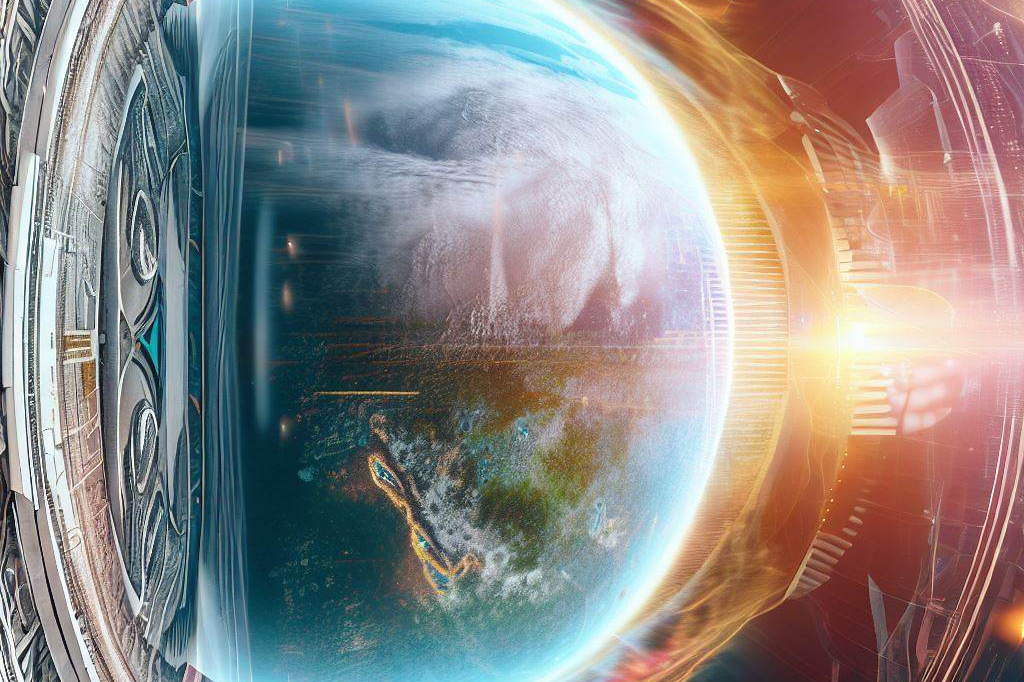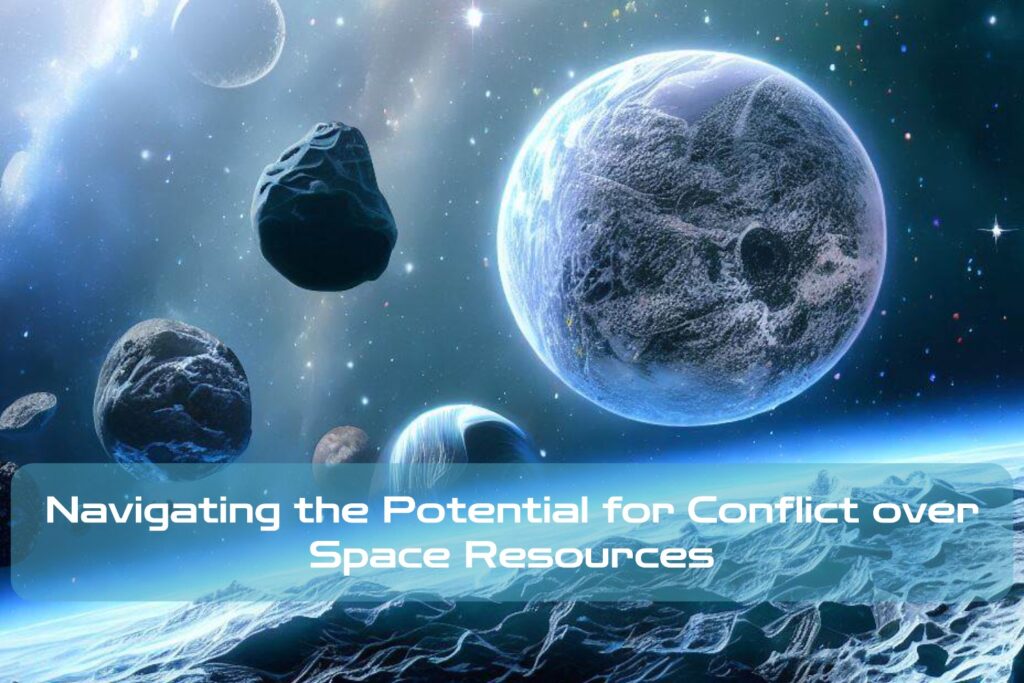The Space Race: What’s At Stake?
Space exploration has long been a fascination for humans, but now it’s more than just curiosity driving us to the great beyond. The potential for valuable resources in space has become a major incentive for countries and companies alike to invest in space exploration. From water and minerals to rare elements like helium-3, outer space offers a wealth of untapped resources that could have significant economic and technological benefits here on Earth.
But as countries race to claim their stake in space resources, the possibility of conflict looms large. With limited amounts of these valuable resources available, competition is fierce and tensions are high.
The threat of conflict over outer-space resources is not just hypothetical – it’s already happening. For example, in 2020 China landed a spacecraft on the Moon with the intention of mining lunar soil for helium-3 – an element that could potentially power nuclear fusion reactors on Earth.
However, this move caused concern among other countries, who fear that China may be attempting to monopolize this valuable resource. This is just one example of how competition over space resources could lead to conflict in the future.
The Great Space Race

In recent years, the exploration of space has become increasingly popular and competitive. Countries such as the United States, Russia, China, and India have all launched missions to explore space and have expressed interest in utilizing its resources. Private companies such as SpaceX and Blue Origin are also vying for a piece of the pie.
With so many players in the game, it’s clear that space exploration is no longer just a matter of curiosity but a race for valuable resources. One of the most sought-after resources in space is water.
Water can be used for drinking by astronauts or converted into rocket fuel through a process called electrolysis. It can also be broken down into hydrogen and oxygen to power fuel cells.
Another valuable resource is minerals such as platinum, iron, nickel, cobalt, and others found on asteroids, which could be mined in situ without ever landing on another planet or moon. But perhaps the most prized resource of all is helium-3 (He-3), an isotope rare on Earth but abundant on the moon that could potentially fuel nuclear fusion reactors capable of providing virtually unlimited energy with no pollution or greenhouse gas emissions.
The competition over He-3 has been fierce since it was first detected on our lunar satellite by Apollo 17 astronauts in 1972. It’s clear that there are many valuable resources available in outer space, which makes it an attractive destination for countries and companies alike.
However, there are some concerns about who has ownership rights over these resources and how they will be extracted without causing any harm to our planet’s environment or other celestial bodies. The next section will take a closer look at these legal challenges governing outer-space activities.
Legal Framework for Space Resource Utilization
Overview of International Treaties Governing Space Activities

Outer space is considered a global commons, which means that it belongs to everyone and no one at the same time. This has led to the creation of international treaties aimed at regulating space activities and ensuring that they are carried out in a peaceful and cooperative manner. The most important of these treaties is the Outer Space Treaty, which was signed in 1967 by the United States, Russia, and several other major powers.
The treaty established important principles such as the prohibition of weapons of mass destruction in outer space, and the requirement that all countries carry out their space activities for peaceful purposes only. However, despite these agreements, there are still legal challenges surrounding the ownership and exploitation of space resources.
For example, there is currently no agreement on who owns resources extracted from celestial bodies such as asteroids or the moon. Some countries argue that they should have exclusive rights to resources extracted by their own companies or citizens, while others argue that space resources belong to all humanity and should not be subject to individual claims of ownership.
Legal Challenges Surrounding Ownership and Exploitation of Space Resources
One major issue surrounding space resource utilization is the lack of clear legal frameworks governing ownership and exploitation. The Outer Space Treaty prohibits nations from claiming sovereignty over celestial bodies or using them for military purposes but does not explicitly address resource extraction on those celestial bodies. This has created ambiguous situations when private companies claim rights to mine asteroids or conduct other forms of resource extraction.
Another legal challenge involves intellectual property rights associated with space-based technologies. It’s unclear how patent law applies in an environment where innovations often result from collaborative efforts across many international borders.
As more private firms join the race towards mining asteroids for precious minerals or establishing permanent bases on planets like Mars – we must develop international laws that address these legal challenges and protect the rights of everyone involved. We need more clarity and consensus on the ownership of space resources, which will require a collaborative effort from all nations involved in space exploration.
Addressing the Legal Challenges of Space Resource Extraction
International treaties are important for regulating space activities and promoting peaceful cooperation, but they do not address all legal challenges associated with resource extraction in outer space. The lack of clear legal frameworks governing ownership and exploitation of space resources has created ambiguity and uncertainty. It is essential that we develop international laws that provide clarity on these issues, to ensure that everyone’s rights are protected in the race towards economic growth through space exploration.
Environmental Concerns: The Dark Side of Space Mining

The mining of space resources has its fair share of environmental concerns. The process of extracting valuable minerals and elements from the moon or asteroids results in significant damage to the surrounding environment. Unlike Earth, space environments are fragile and non-renewable, which makes it extremely difficult to reverse the damage caused by mining activities.
The process of mining involves using heavy machinery and equipment, which leads to soil disturbance, fragmentation, and erosion. Due to the low gravity on the moon, machines can easily dig deep into the regolith and cause permanent scars that will remain visible for millions of years.
This type of land modification is irreversible and can have a significant impact on the biodiversity of celestial bodies. Another environmental issue related to space exploration is rocket launches.
Every time a rocket is launched into space, it releases greenhouse gases such as carbon dioxide (CO2), nitrogen oxides (NOx), water vapor (H2O), and other harmful chemicals into the atmosphere. These emissions contribute significantly to climate change on Earth.
Potential Consequences on Earth’s Atmosphere due to Rocket Launches

The impact of rocket launches on Earth’s atmosphere cannot be ignored. Each year, thousands of rockets are launched into orbit around our planet, resulting in millions of kilograms’ worth of pollutants being released into our atmosphere. Studies have shown that these emissions lead to depletion of our ozone layer and an increase in acid rain levels.
Furthermore, rocket launches also contribute significantly to global warming by releasing greenhouse gases such as CO2 into our atmosphere. These gases trap heat from the sun within our planet’s boundaries, leading to an increase in global temperatures. In addition to this,the boosters used during launch produce highly toxic chemicals such as hydrochloric acid (HCl), which can pose a serious threat if not handled properly.
It is important for all entities involved in space exploration, including governments, private companies, and individuals, to take environmental concerns seriously and ensure that all necessary measures are taken to minimize the impact of these activities on our planet’s atmosphere. It is our moral responsibility to safeguard the environment for future generations by promoting sustainable practices in space exploration.
Security Implications: Protecting Outer Space Resources

With the increasing competition for valuable resources in outer space, it is essential to consider the security implications of space exploration and resource extraction. In recent years, there has been a rise in threats posed by other countries or non-state actors to disrupt or damage space infrastructure.
Such threats are a significant cause of concern as they can lead to significant economic and strategic losses. The United States Space Force, established in 2019, is primarily responsible for ensuring the protection of American space assets.
However, other countries, such as China and Russia, have also established dedicated military units for space operations, indicating the growing importance of strategic assets in outer space. Moreover, non-state actors like hackers and terrorists pose an increasing threat to critical infrastructure on Earth and in orbit.
Threats posed by other countries or non-state actors
Countries like China and Russia have been accused of conducting anti-satellite tests that could pose an immediate threat to satellites belonging to other countries. Similarly, non-state actors could launch cyberattacks or use kinetic weapons against vulnerable satellites. The impact of such attacks could be severe – disrupting communications systems that rely on satellite data.
The need for protection measures
To ensure safety and security in outer space, it is necessary to take precautionary measures at different levels. At a national level, governments need to establish robust policies governing outer-space activities while ensuring compliance with international laws governing peaceful uses of outer space. Companies involved in resource extraction should be required to follow best practices related to cybersecurity and adopt standards that safeguard critical infrastructure.
As humanity ventures further into deep-space exploration and utilization of resources beyond our planet’s atmosphere, the risks associated with these activities cannot be ignored. Therefore, it’s essential that collaborative efforts are made between nations through diplomatic channels towards creating regulations that ensure the safe and peaceful utilization of outer space.
Diplomatic efforts towards cooperation

Space Cooperation: Collaboration is Key
The potential for conflict over space resources is a topic that has garnered much attention in recent years, but it’s not all doom and gloom. Diplomatic efforts toward cooperation can help ensure peaceful utilization of outer-space resources.
For example, the International Space Station (ISS) is a prime example of international collaboration in space exploration. A joint venture between five different countries, the ISS is a symbol of diplomatic cooperation and peaceful utilization of outer-space resources.
Cooperation to Avoid Conflict
The importance of diplomacy in avoiding conflicts over limited resources cannot be overstated. As countries increasingly explore outer-space for valuable resources such as water, minerals, and helium-3, the potential for conflict rises exponentially. Yet by establishing clear communication channels and engaging in open dialogue with other space-faring nations, diplomatic solutions can be found to address concerns before disagreements escalate into full-blown disputes.
The Role of Diplomacy
Diplomacy plays a vital role in ensuring that disputes are resolved peacefully and amicably without resorting to armed conflict or other forms of aggression. It’s essential that countries work together towards peaceful collaboration when it comes to utilizing outer-space resources. By doing so, they can avoid the possibility of conflict while simultaneously building trust between nations.
Final Thoughts

Space resources are becoming increasingly important due to the expanding needs of humanity. As countries and companies race to extract valuable resources, potential conflicts may arise, leading to diplomatic, legal, environmental, and security issues.
The legal framework for space activities is still developing and requires careful consideration to ensure a peaceful approach towards the utilization of outer-space resources. The potential damage caused by mining activities in outer space and rocket launches also needs attention.
It is important that countries work together towards establishing norms of conduct in outer space to prevent any conflict or damage caused as a result of resource extraction activities. In spite of these challenges, there is great hope for the future prospects for peaceful utilization of outer-space resources.
Diplomatic efforts toward cooperation between nations can play a vital role in mitigating the possibility of conflicts over limited resources. With continued international collaboration on research and development efforts related to space exploration and extraction, humanity can reap the benefits of these valuable resources while also preserving the environment and ensuring international peace.
A Positive Outlook
The utilization of outer-space resources has great potential not only for economic gain but also for scientific advancement that could benefit all mankind. This presents an opportunity for nations to work together instead of competing against each other.
Through collaboration in research, development, and exploration efforts, we can achieve sustainable resource extraction while preserving peace both on Earth and beyond our planet’s atmosphere. We must view this new frontier as a shared resource that requires cooperation among nations rather than nationalism or competition.
Our ability to peacefully utilize these vast resources will be essential not only for our own prosperity but also for securing a bright future for generations yet unborn. The world today faces many challenges; however, if nations can come together with a common goal – peaceful use of outer-space – it could truly herald a new era of cooperation and hope for the future.
FAQ: The Potential for Conflict over Space Resources
1. What are space resources?
– Space resources refer to the natural materials and substances found in outer space that can be utilized for various purposes. These resources include minerals, water ice, rare metals, and other valuable substances present on celestial bodies like the Moon, asteroids, and even other planets.
2. Why is there a potential for conflict over space resources?
– The potential for conflict arises due to the increasing interest in and exploration of space resources by various nations and private entities. As the understanding of the economic and strategic value of these resources grows, competition for their exploitation and utilization may lead to conflicts between different stakeholders.
3. Which countries are actively involved in space resource exploration?
– Several countries have shown significant interest and involvement in space resource exploration. The United States, China, Russia, and India are among the leading nations with active programs and missions focused on space resource prospecting and utilization. Additionally, private companies such as SpaceX and Blue Origin are also investing in space mining technologies.
4. What are the main challenges associated with space resource extraction?
– Space resource extraction presents several unique challenges. Firstly, the technological aspects of extracting resources from celestial bodies are complex and require sophisticated equipment and techniques. Additionally, the legal and regulatory framework surrounding space resource extraction is still evolving, leading to uncertainties and potential disputes. Moreover, the long distances involved in space missions and the associated costs make resource extraction economically challenging.
5. Are there any international agreements or laws addressing space resource utilization?
– Currently, there is no universally accepted international legal framework specifically addressing space resource utilization. However, efforts are being made to establish guidelines and regulations. The United Nations Office for Outer Space Affairs (UNOOSA) has been actively involved in facilitating discussions among nations to develop a framework that promotes peaceful and cooperative space resource exploration.
6. How can conflicts over space resources be prevented or resolved?
– To prevent and resolve conflicts over space resources, international cooperation and diplomacy are crucial. Establishing clear rules and guidelines for resource extraction and sharing will help manage competing interests and minimize the potential for conflicts. Open dialogue, transparency, and collaboration among nations, private entities, and international organizations can contribute to a peaceful and equitable exploration of space resources.
7. What are the potential benefits of space resource utilization?
– Space resource utilization offers numerous potential benefits. Firstly, it could provide a sustainable source of valuable resources that are scarce on Earth, such as rare metals and minerals. This could contribute to advancements in technology, manufacturing, and energy production. Additionally, space resources could support long-duration space missions, such as establishing a sustainable presence on the Moon or other planets, by providing essential materials for life support systems and infrastructure.
8. Is space resource utilization economically viable?
– While space resource utilization holds significant potential, its economic viability is still being evaluated. The costs associated with space missions, resource extraction, and transportation back to Earth are substantial. However, as technological advancements continue and the demand for resources increases, the economics of space mining could improve. Furthermore, the development of in-space manufacturing capabilities could reduce the costs by utilizing resources directly in space.
9. How can space resource extraction impact the environment?
– Space resource extraction, if not managed properly, could have potential environmental impacts. The disruption of celestial bodies during mining operations and the release of dust particles into space could affect the natural balance of the extraterrestrial environment. Therefore, it is essential to develop responsible mining practices and ensure the sustainable use of space resources to minimize any adverse effects.
10. Are there any ethical considerations associated with space resource utilization?
– Yes, space resource utilization raises various ethical considerations. These include questions about the equitable distribution of resources, the potential exploitation of celestial bodies, and the preservation of cultural and historical sites on other planets or moons. Addressing these ethical concerns requires careful planning, international cooperation, and adherence to ethical principles to ensure the responsible and sustainable utilization of space resources.
TL;DR…
🚀 Space Exploration and Resources: The article discusses the increasing interest and competition over valuable resources found in space, including minerals, rare metals, and water ice.
🔒 Security Implications: There is a rising concern over threats to space infrastructure from countries and non-state actors like hackers and terrorists.
🌎 Environmental Concerns: Space exploration and resource extraction can lead to environmental issues, including space debris and potential climate impacts.
🌐 International Cooperation: The article emphasizes the importance of diplomacy and cooperation in avoiding potential conflicts over space resources. The International Space Station (ISS) is presented as a model of such collaboration.
📜 Legal Framework: There is a need for a comprehensive legal framework to govern the exploration and utilization of space resources. The United Nations Office for Outer Space Affairs (UNOOSA) is facilitating discussions among nations to develop such regulations.
🔬 Scientific and Economic Potential: The utilization of space resources could lead to significant advancements in technology, manufacturing, and energy production, despite current economic and technological challenges.
🍃 Sustainable Practices: The importance of sustainable and responsible practices in space exploration and resource extraction is emphasized, including adherence to environmental standards and ethical principles.
⚖️ Conflict Resolution: The article underlines the role of diplomacy, transparency, and international cooperation in preventing and resolving potential conflicts over space resources.
🔮 A Hopeful Outlook: The article concludes with an optimistic perspective, urging nations to view space resources as shared assets that, through cooperative efforts, could lead to a brighter, peaceful future for humanity.

C M, a seasoned editor, journalist, and consultant, is deeply fascinated by the convergence of technology, space, and the future of humanity.
With a particular interest in transhumanity, futurology, and the philosophical and ethical dimensions of these domains, C M serves as the lead contributor to SpaceSpotlight and TranscendSphere.
When not penning insightful articles on these rapidly evolving fields, C M indulges in their love for podcasts and books, proudly embracing their status as a ‘Happy Nerd Extraordinaire!’



